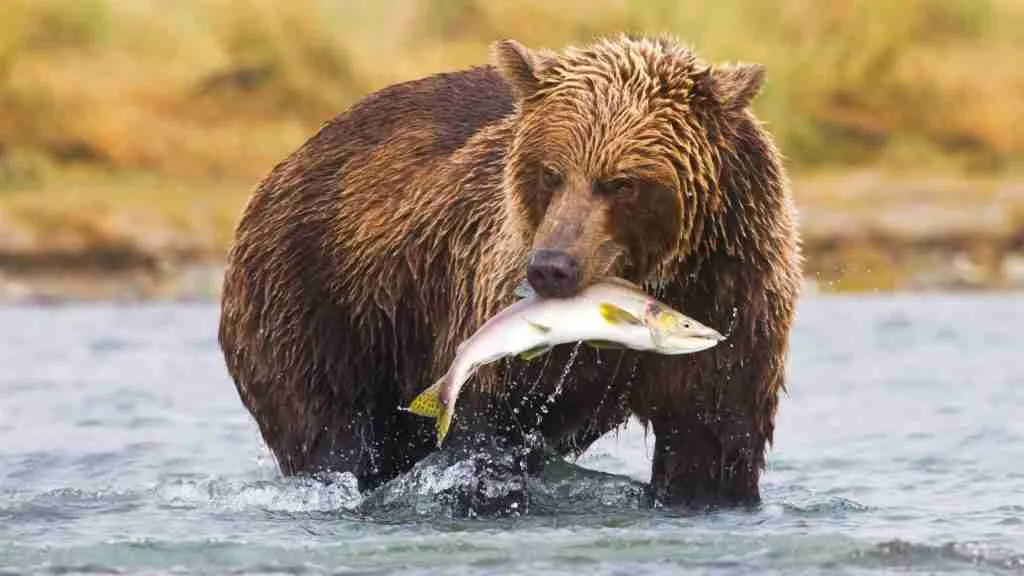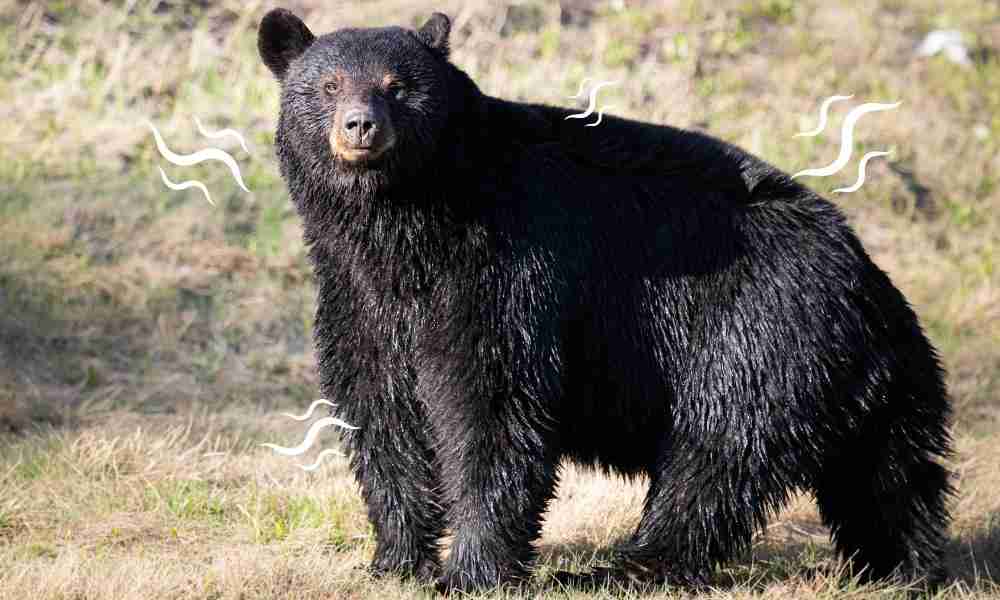It’s a common belief that bears have a bad smell, but that’s not true! People who have been close enough to smell them have confirmed that bears don’t stink.
In this article, we’ll cover everything you need to know about the scent of bears. Let’s get started!
Do All Bears Stink?
No, not all bears stink. It’s easy to assume they have a strong, unpleasant smell since they are wild animals.
However, most of them don’t have any obvious odor. Their scent is fairly neutral.
Each species has its scent, but it depends on its diet and who is smelling it.
You can now tell how bears generally smell. But do you think each species will have their special smell? Let’s find out below!
Do Black Bears Stink?
No, black bears do not usually stink. They have a unique smell particular to their species, which is described as musky or earthy.
They can only stink if they roll in smelly substances or during their breeding season. Adult males produce a strong smell from a gland on their abdomen.
They do this to attract female partners and scare away other male bears that might want to contest for the same mate.
Additionally, black bears can smell bad when they eat carrion. This is because the bacteria that break down the dead animal release gasses that have a foul odor.
Do Brown Bears Smell Bad?
Contrary to popular belief, brown bears don’t smell bad. They have a musky scent that is not too strong. This scent is produced by the scent glands in their armpits and feet.
But some things can make a brown bear smell bad. If a brown bear has been eating a lot of carrion, its breath, and fur may smell bad.
In addition to that, a brown bear can have a foul odor if it has been rolling in smelly substances, such as rotten meat or dead fish.
Do Polar Bears Stink?
No, polar bears don’t stink. They smell as fresh as the snow in which they live. They have a mild, musky scent produced by their scent glands.
These animals don’t smell bad because of their environment. Their habitat is made up of ice, water, and snow which is a neutral-smelling environment.
Since they don’t have enemies in their habitat, they don’t need to scent-mark their territory. Hence, there’s nothing to make them have a foul smell.
Nevertheless, they don’t always smell good. A polar bear that is eating a seal may stink off it. Also, an adult female coming out from the den with a newborn can smell.
Do Giant Pandas Smell Bad?
Giant pandas don’t smell bad – they have a musky smell that is not too strong and is usually described as earthy or fresh.
This scent is produced by scent glands in their armpits and feet just like other bears. Whether or not someone thinks they smell bad is subjective.
Regardless, if a panda has been eating a lot of carrion, their breath, and fur can smell bad.
Moreover, if they’ve been rolling around in smelly stuff like rotten bamboo or dead leaves, they may have a strong odor.
What Do Bears Smell Like?
The way a bear smells depends on their species, diet, and level of activity. Generally, they have a musky smell that is not too strong.
Some may have a fresh, earthy scent, while others may have an offensively unpleasant smell similar to that of a wet dog on a hot day.
Many people find the smell of bears to be nice, while others don’t. It’s just a matter of personal preference.
Take Note
Bears’ smell is a natural trait and not a sign of being unclean. These creatures are clean animals and take care of themselves regularly.
Do Bears Smell Musky?
Yes, bears have a musky smell. Mature males in particular have a distinctive scent on the crown and back of their neck.
They use it to mark their territory, attract mates, and communicate with other bears by rubbing against trees.
Do Bears Smell Like Wet Dogs?
Yes, certain species of bears, such as brown and black bears, can smell like wet dogs. This happens if they’ve been swimming or playing in the water for an extended period.
By doing so, their fur becomes wet and takes on a more strong odor that’s similar to that of a wet dog.
Do Bears Smell Like Skunks?
No! bears do not smell like skunks. Both animals have different smells that are easily differentiated from each other.
Bears are clean creatures with a musky or earthy scent. Skunks, on the other hand, have a very strong, foul odor just like a rotten egg.
They produce this smell from the two scent glands located near their tail, and they can spray it up to 10 feet away. Funny enough, it’s very difficult to get rid of this smell in any environment.
Do Bears Smell Like Urine?
No, bears don’t smell like urine. They mostly stay clean and fresh with a musky smell.
However, when they urinate more often and get their fur wet with the urine, they can smell like it.
It’s important to know that this is not a common occurrence. Bears are clean animals, hence, they are usually careful of where and how they excrete.
Now that you’ve got a whiff of what bears smell like, let’s take a look at some of the factors that can affect their smell.
5 Factors Affecting The Way Bears Smell
Habitat/ Environment
Habitat is a major factor that influences the smell of bears. The plants and animals found in a particular habitat can give off different smells.
Bears that live in forests may have a different smell from those that live in mountains and deserts.
Additionally, the weather conditions in that environment can contribute to the way the bear will smell.
Bear species that live in warm climates have a more strong odor than those that live in cold climates. This is because warm weather allows bacteria to grow quickly.
For example, polar bears live in a habitat that is mostly composed of water, ice, and snow. This is a very neutral-smelling environment.
Diet

What a bear eats can affect their smell. In general, bears eat plants, meat, and processed food.
And a bear’s smell is associated with the compounds and oils found in these foods. This is similar to humans, they tend to smell like what they eat.
That’s why bears such as polar bears and some brown bears that mostly eat meat have a meaty smell.
But bears that eat vegetation (berries or bamboo) can have a sweet scent like those vegetation. It appears that the smell is coming from their skin pores.
Mating Season
During the breeding season, both male and female bears experience behavioral changes that can influence the way they smell.
Mating season causes hormonal changes in bears, increasing scent production and marking activities. Male bears become more active in marking their territory with their scent.
They often do this using their scent glands located around the anal region, feet, and armpit for most bear species.
Similarly, female bears release certain pheromones that show they are ready to mate. These pheromones add to the overall smell in the environment and attract males looking for a mate.
Bear Species and Level of Activity
Different bear species, such as black bears, grizzly bears, or polar bears, have slight variations in their natural smell. Each species has its own unique smell.
Their level of activity also determines how they will smell. More active bears have a stronger odor than those that are less active.
This is because active bears sweat more, resulting in a buildup of bacteria on their fur. And when these bacteria grow (in warm weather conditions), they make these bears smell awful.
Hygiene and Health Status
Bears are known to take care of themselves by grooming regularly. It helps to keep their fur clean, get rid of dirt, and maintain overall hygiene.
Those who groom themselves regularly mostly have less smell than those who don’t groom properly.
It’s the same for bears that are healthy, and free from any diseases or infections. They have a neutral or pleasant smell.
This is contrary to bears that are sick, hurt or have certain health issues. Their conditions can cause them to give off bad smells that can be easily perceived.
Does Bear Meat Stink?
No, bear meat doesn’t stink! Generally, it has a distinct gamey (not unpleasant) smell. Just like raw lamb meat has its unique scent.
However, the strength of the smell depends on the age of the bear, its diet, how it was handled after being hunted, and the cooking method used.
Can You Smell Bears From a Distance?
Generally, humans can not smell bears from a long distance. Bears have their natural musky scent, but it is not strong enough to be detected from afar, particularly in an open environment.
You can only smell bears if you are in the direction of the wind or close to them. This is especially true when they have marked their territories or released their scent.
Bear Scent Marking: Do Bears Leave Scent (and Why)?
Yes, bears leave a scent. They have scent glands in various parts of their body, which produce a musky odor. They mark their scents in different ways such as tree scratching, rock rubbing, urine, and feces.
The primary reason behind this is to announce their presence, reproductive status, dominance, and territorial boundaries so that they can avoid unnecessary conflicts.
These animals do great by scent-marking their environment, but do you know how each species does it? Keep reading to learn more.
Black Bears
Black bears have scent glands in their armpits, cheeks, and feet, and at the base of their tail.
These glands produce a musky scent for marking territories, attracting mates, and communicating with other bears.
To mark their scents, black bears will rub their bodies against trees and rocks. They can urinate and defecate in notable places too.
Male black bears are often known to do this to announce their presence and attract females. The females are usually more careful, leaving their scent under rocks or in caves.
Brown Bears
Brown bears, like many other bear species, have a unique way of making their presence known.
They leave their scent through scent glands located in their armpits, paws, and feet! These glands produce a musky odor which they use to show territorial dominance.
Additionally, brown bears leave their scents in different ways including urine marking, rubbing, and scratching of trees.
These bears do this to make sure other bears understand that they’re around. Likewise, they do it to attract themselves a mate and ensure their territory is well-defined.
Polar Bears
Polar bears have special scent glands on their paws and between their toes. These scent glands release a unique smell which these bears use to mark their space while walking around.
Scent marking is an important part of their life. It helps them to communicate with each other and avoid confrontations.
Polar bears share some scent-marking habits with brown bears but still have unique Arctic methods.
They roll on seal remains, rub on Ice or snow mounds, and sometimes use urine marking.
Giant Pandas
Giant pandas, also known as panda bears, have a different method of leaving scent marks, unlike other bear species.
Scent marking is a significant form of communication for giant pandas. They use it for a variety of social and reproductive purposes.
This includes marking territories and attracting mates. These animals have their scent glands located in their armpits and feet. These glands produce a musky smell.
They mark their scents by rubbing their bodies against trees and rocks, or by peeing and pooping in visible areas.
Sloth Bears
Sloth bears have a unique method of communicating with one another and marking their territories through scent.
They have scent glands in their armpits and feet, similar to other bears, which also produce a musky smell. This odor is used to mark their territory, attract mates, and send messages to other sloth bears.
Sloth bears will always leave their scent by rubbing their bodies against trees and rocks, or peeing and pooping in notable places.
Related Questions:
Do Bears Bath?
No, bears do not bathe. They do not have the physical ability to lather up with soap and water as humans do.
Nevertheless, they have certain behaviors that help them to keep their fur clean and free of parasites.
Bears rub their bodies against trees and rocks to remove dirt. They also roll in the mud to protect their skin from the sun and insects.
In addition, they sometimes swim in lakes and rivers to cool off when they feel hot. By doing so they get rid of parasites.
They groom themselves by licking their fur and using their paws to scratch. This helps to remove loose fur and dirt and also helps to spread oil throughout the fur, keeping it waterproofed.
Do Bears Have Bad Breath?
In general, bears don’t have bad breath. But their meat diet can give off a strong smell that isn’t exactly pleasant.
On the other hand, bears that eat berries and other plants mostly have milder breath. Moreover, they have a big tongue that’s full of bacteria.
This bacteria helps break down their food, but it can also make their breath smell a bit funky.
Additionally, when bears feel threatened or angry, they start to pant, and this can make their breath even worse!
Recap
In summary, bears don’t stink. They have a musky or earthy smell that is not so unpleasant.
Sometimes, they can smell like wet dogs if they’ve been swimming for a long time. But they don’t smell like skunks or urine.
Bears are clean and self-grooming creatures, but several factors can affect how they smell. These factors include:
- A bear’s habitat or living environment
- The kind of food eat
- Species of bear
- Level of activity
- ear’s mating season
- Health status and ability to groom regularly
Despite how a bear smells, humans cannot detect it from a long distance. This is because the smell is not so strong to be perceived from afar.
Bears are truly fascinating animals that are often misunderstood. They have a long snout on their faces just like pigs.
They sometimes roll in the mud just the way pigs do. This might get you wondering if there is any connection between bears and pigs.
Check out our article ”Are Bears and Pigs Related?” to find out.
Sources:

